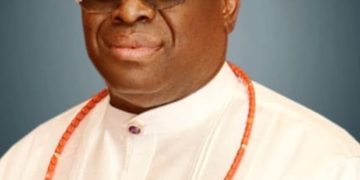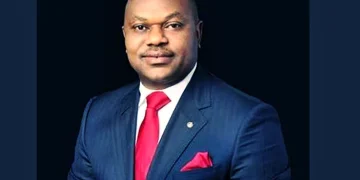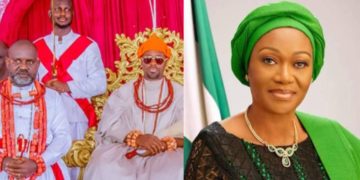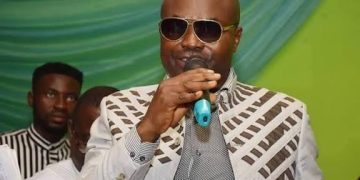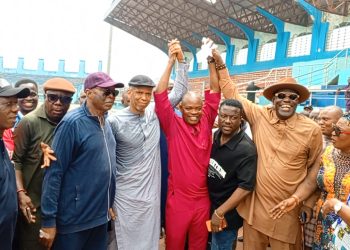By Patrick Edema
As Delta State marks its 31st creation anniversary Saturday, August 27, 2022, there are high hopes and expectations from all stakeholders to ensure that the dreams of the founding fathers are expressed through good governance engendered by pragmatic and robust policies and programs.
31 years ago, precisely 27th of August 1991, former self-styled military President of Nigeria, retired General Ibrahim Badamosi Babangida decreed Delta state into existence by military fiat.
The creation pave way for the successive military administrators that held sway.
Air Commodore Luke Chijiuba Ochulor was first appointed as administrator and served from August 28 1991 to January 1992. He had to put in place the necessary administrative structures and manpower for the smooth take-off of the young state. His exit followed the democratic experiment of the Babangida era that saw the emergence of late Olorogun Felix Ovoderaye Ibru as the first civilian governor of the state under the platform of the Social Democratic Party, SDP.
Olorogun Ibru brought his charismatic leadership style to bear in the governance of Delta by drawing the master plan to transform Asaba into a befitting capital city.
He established the Delta state university with two campuses at Abraka and Anwai, Delta Broadcasting Service Warri and the Ubulu-Uku transmission station.
Unfortunately, his tenure was aborted in November of 1993 following the controversial annulment of the June 12 election that was won by the late MKO Abiola.
He was immediately succeeded by Alhaji Abdulkadir Shehu who mounted the saddle for only 24 days between November 17, 1993, and December 10, 1993, as an administrator before he was replaced by Col Bassey Asuquo same day and stayed in office till September 26 1994.
In the same month, late Gen Sanni Abacha appointed Group Captain Ibrahim Kefas to replace Asuquo as the military administrator of Delta state and served till August 22, 1996.
Not long after, Lt Col. John Dungs sauntered into office and ruled in the space of two years from August 22 1996 to August 12 1998 shortly after Gen Abdulsalami Abubakar succeeded Sanni Abachi as head of state.
Navy Commander Walter Feghabor served as the last military administrator in the state from August 12 of 1998 to May 29 of 1999 which saw the emergence of the fourth republic midwifed by the military junta led by Gen Abdulsalami.
The 8 years of military administration in Delta State were characterized by little or no meaningful socio-economic and infrastructural development due to the ad-hoc and transient nature of their tenure.
The general elections of February 27, 1999, saw the election of Chief James Onanefe Ibori as the second civilian governor of the oil-rich state.
Chief Ibori held sway at Osadebay House for two terms where he redefined the political, socio-economic and infrastructural development of the state.
Ibori established three polytechnics in the three senatorial districts of the state and a College of Physical Education at Mosogar as well as infrastructure upgrades at the three campuses of the state university.
On May 29, 2007, Dr Emmanuel Eweta Uduaghan succeeded Chief Ibori and came up with his three-point agenda of Peace and Security, human capital development and Infrastructural development.
His infrastructural program birthed several roads across the state including two flyovers in Asaba and Effurun, the Asaba international airport as well as other massive educational and health facilities among others.
However, in between Dr Uduaghan’s two terms in office, late Rt Hon Sam Onhyeka Obi, a prince from Ute-Okpu Royal family in Ika North East Local Government Area of the state and former Speaker of the state House of Assembly, became acting governor on November 9, 2010, following the nullification of Uduaghan’s election by the Court of Appeal in Benin which ordered a re-run election within 90 days.
The current governor, Dr Ifeanyi Arthur Okowa took over the reins of power on May 29, 2015, and with an uncommon zest, set out to redefine the parameters of governance through his SMART agenda.
As of June 30, 2021, the Okowa administration has constructed 799 roads spanning over 1,500 kilometres and 908 kilometres of drains across the state.
His most ambitious projects include but are not limited to the establishment of three new universities, two in Delta in North, the University of Delta Agbor and Dennis Osadebay University, Asaba and the University of Science and Technology, Ozoro in Delta South.
The newly commissioned multi-billion naira Professor Chike Edozien Central Secretarial Complex, Asaba is another signature project of the current administration.
In a state with over 6 million people by the 2020 estimates, Delta boasts of at least 14 urban centres with road being the dominant mode of transportation.
The economy is largely oil-dependent but blessed with huge natural resources including kaolin, tar sand, limestone, industrial clay and silica. The state is blessed with good ecology and arable land for agriculture and aquaculture.
Although regarded as a microcosm of Nigeria due to the existence of diverse ethnic nationalities, the people are enterprising and hospitable.
The tourist attractions in Delta state include but are not limited to the Landers Brothers Anchorage, Asaba, The Araya Bible site, River Ethiope and the Nana’s Palace built by Chief Nana Olomu of Ebrohimi.
People of the state are sports enthusiasts as Delta continues to show its dominance in various sports such as football, athletics and swimming.
Prominent footballers like the late Stephen Keshi and Austin Jay-Jay Okocha among others are all from the state.
Athletes including Blessing Okagbare and celebrities like Atunyota Akpobome popularly known as Ali Baba, Bovi, and Omawunmi Megbele, to mention but few are proud citizens of the state.
Ahead of the 2023 general elections, it is expected that Nigeria’s electoral umpire the Independent National Electoral Commission (INEC) will ensure a transparent process and Deltans who have their Permanent Voter Cards would equally play their part by voting for the person who is passionate for the development of the state to continue from where Governor Okowa will stop when he exits power on May 29, 2023.
• Edema is of the Editorial Unit of Delta Broadcasting Service and writes from Warri



